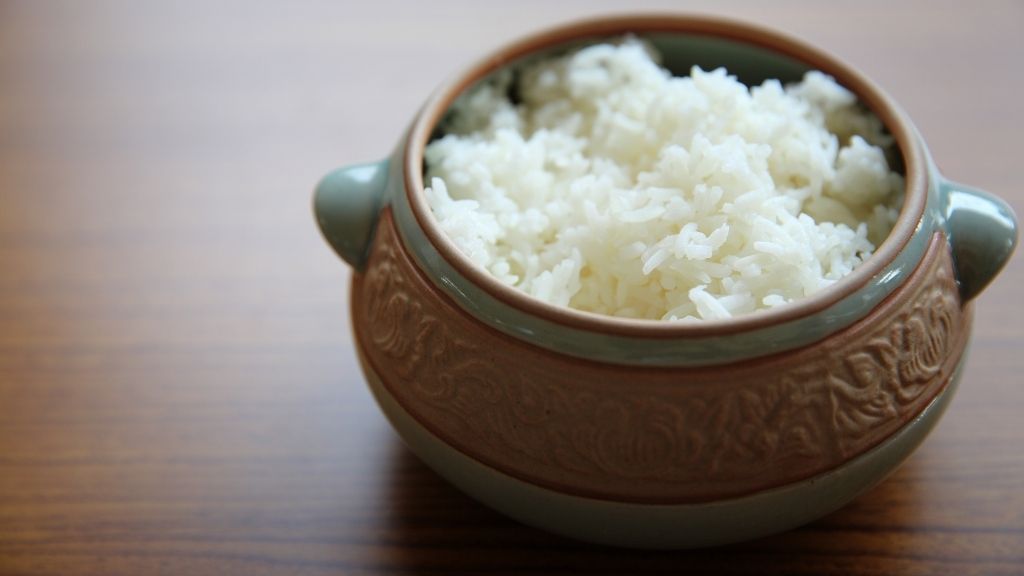Can We Eat Rice at Night? – Here’s What You Need To Know

Craving some fried rice at night but heard the rumors of how you shouldn’t eat rice at night? Maybe you can afterall have your fried rice. Eating it at night is okay! Read on to find out more.
Rice is Asia’s climatically and culturally adapted principal source of carbohydrate and protein. This grain is the seed of the grass species Oryza sativa and is primarily grown in Asia and parts of Africa due to the suitable hot and wet climate.
Since rice is primarily grown in Asia, it goes unsaid that it is a staple in the eastern countries. You can find Asians consuming rice throughout the day with thin curry, with vegetable or meat sides, and at times seasoned with spices and vegetables. Now in the west, rice is consumed mainly by Asians who have migrated, and at times by the people from said land; however, how often they consume rice is comparatively less than Asians.
Rice is eaten at all times of the day worldwide, morning, noon, and even at night, but can we eat rice at night is a question that has been debated for a considerable amount of time.
How nutritious is rice?
Rice is a highly nutritious grain; red rice, brown rice, and white rice all hold the same nutritional value. The only difference would be in their color, which is often the result of how they’re processed.
Brown and red rice are comparatively healthier than white rice since they retain the outer barn and cereal germ. They are rich in fiber, although they contain the same levels of carbs. However, brown rice also has higher arsenic levels than the others. Since white rice is the most consumed type of rice grain, let’s take a look at its nutritional value in particular.
Rice nutritional value per 100g
The following are rice nutrition facts 100g according to the USDA [1].
| 365 kcal Energy | ||
| Nutrients | Content in 100g | RDA (% of total RDA) |
| Macros | ||
| Total Carbohydrate | 80 g | 130 g (50.8%) |
| Fiber | 1.3 g | 30 g (4.3%) |
| Sugar | 0.12 g | 30 g (0.4%) |
| Protein | 7.13 g | 52 g (13.7%) |
| Total Fats | 0.66 g | 77 g (0.85%) |
| Polyunsaturated fatty acids | 0.177 g | 22 g (0.80%) |
| Monounsaturated fatty acids | 0.206 g | 44 g (0.46%) |
| Saturated fatty acids | 0.18 g | 30 g (0.6%) |
| Micros | ||
| Selenium | 15.1 mcg | 55 mcg (27.45%) |
| Manganese | 1.09 mg | 4 mg (27.25%) |
| Copper | 0.22 mg | 0.9 mg (24.4%) |
| Phosphorus | 115 mg | 700 mg (16.4%) |
| Vitamin B6 | 0.164 mg | 1.7 mg (9.6%) |
| Zinc | 1.09 mg | 11 mg (9.9%) |
| Magnesium | 25 mg | 420 mg (5.9%) |
| Iron | 0.8 mg | 18 mg (4.4%) |
| Potassium | 115 mg | 3400 mg (3.4%) |
| Calcium | 28 mg | 1000 mg (2.8%) |
| Vitamin E | 0.11 mg | 15 mg (0.73%) |
| Sodium | 5 mg | 2000 mg (0.25%) |
| Vitamin K | 0.1 mcg | 90 mcg (0.1%) |
Rice is nutritious, no doubt, but it also consists of high levels of carbs and low levels of fiber; this is not ideal for your body and can cause various side effects like an increased risk of diabetes and chances of developing a metabolic syndrome [2,3,4].
However, it’s also important to mention that rice has its own set of benefits.
- It is gluten-free, therefore making it accessible to individuals who might have a gluten allergy or individuals on a gluten-free diet [5].
- It is a powerhouse of energy since carbs can be broken down quickly in our bodies to produce energy [2,3].
- It is easy to digest and can be light on the stomach [6].
Keep these effects and benefits in mind because what we’re going to discuss now will circle back to everything we have already discussed.
What is it we’re going to cover now, you ask?
Can we eat rice at night?
You get done with dinner and head to bed. You’d assume that you’re done for the day, and so is your body, right? Wrong. You might fall asleep, but when you’re sleeping is when your body is functioning at full throttle. Your brain processes everything that has happened during the day; it gets rid of toxic waste, nerve cells communicate, and reorganize. On the other hand, the body repairs cells and restores energy, and releases molecules like hormones and proteins. The digestive system, although not highly active, still functions when asleep. This digestion occurs when you’re asleep, and only when you fail to wait at least 2-3 hours between dinner and bedtime.
| Sleeping or lying down right after eating presses the food and the acids against the bottom of your oesophagus, and puts you at risk of heartburn, acid reflux, and indigestion. |
Since your body is active when you’re asleep, it’s essential for you to provide it with nutrients to suffice until the following day—nutrients like proteins, vitamins, minerals, fibers, and carbohydrates. Consuming a mix of these before bed would be the move.
Now back to whether eating rice at night is a good idea or not.
Remember when I mentioned that we would circle back to the benefits and effects? This is where we mention them again.
Rice is high in starch and carbs. These particular nutrients break down quickly and are easy to digest. It is also a dish that leads to an instant spike in blood sugar levels due to how easily it’s broken down. This produces energy, and this sudden burst of energy is used up as quickly as it was produced. No energy during the night can affect your bodily functions, and you might wake up extremely hungry.
Now, not only are you waking up hungry, but you are also depriving your body of nutrients in the night. And even if you are providing nutrients in the form of rice, it’s getting used up even before you can settle down and get to bed.
What also needs to be considered while discussing whether we can eat rice at night or not are foods with a high glycemic index (GI) and how they’re related to improved quality of sleep. The glycemic index (GI) of a food is a measure of how quickly a food increases your blood sugar, and as discussed, rice is known to rapidly increase your blood sugar levels. Therefore we can say that rice has a high GI, and foods with a high GI are known to improve your sleep quality. It is also suggested to consume GI-rich foods an hour before you get to bed to help improve sleep quality [7].
| With all this information in place, we can say that eating rice at night isn’t the best decision you could make, but consuming it at night isn’t as harmful either. What would be the right thing to do is control your portions and ensure you’re eating a balanced meal consisting of all nutrients. |
But is it harmful to eat rice at night?
No. It isn’t harmful, but consuming it in moderation is vital to your health.
FAQ’s
Will eating rice at night make me fat?
No, Eating rice at night will not make you gain weight. In fact, by eating rice at night, you are starving your body of the nutrients it requires throughout the night since rice gets digested quickly, and the energy is used up just as quickly.
Is brown rice healthier than white rice?
Brown rice retains the outer barn and is therefore rich in fiber compared to white rice. However, it doesn’t vary in its nutritional value when compared to white rice; unless you purchase fortified rice, in which case, you will have to read up about the company and how reliable they can be regarding the number of nutrients they add to their rice.
Can I eat rice daily?
There are no severe side effects of consuming rice in moderation daily. However, if not controlled, you will risk the chance of developing diabetes or other metabolic syndromes.
Wrapping Up
Rice, a grain found in almost every Asian household, is convenient to cook and is nutritious. It is fibrous, rich in carbohydrates, and can improve your sleep quality. It is nutritious, yes, but is it ideal to consume at night? The answer to that is a little more than just a yes or no. Whether you should consume rice at night depends on your portions and what else you will be eating alongside it. Eat it in moderation, and you should be good.
However, as a thumb rule, make sure that your plate is filled with greens, proteins, carbs, and a small part of the dairy. A balanced meal can never do you wrong.
References
- USDA. “Rice, white, long-grain, regular, raw, unenriched.” Food Data Central, (2019).
- U.S National Library of Medicine. “Counting carbohydrates.” Medline Plus, (2021)
- Sun, Qi et al. “White rice, brown rice, and risk of type 2 diabetes in US men and women.” Archives of internal medicine vol. 170,11 (2010): 961-9.
- Bahadoran, Zahra et al. “White rice consumption is a risk factor for metabolic syndrome in Tehrani adults: a prospective approach in Tehran Lipid and Glucose Study.” Archives of Iranian medicine vol. 17,6 (2014): 435-40.
- NIH. “Eating, Diet, & Nutrition for Celiac Disease.” NIDDK, (2020).
- Gupta, Raj Kishor et al. “Reduction of phytic acid and enhancement of bioavailable micronutrients in food grains.” Journal of food science and technology vol. 52,2 (2015): 676-84.
- Halson, Shona L. “Sleep in elite athletes and nutritional interventions to enhance sleep.” Sports medicine (Auckland, N.Z.) vol. 44 Suppl 1,Suppl 1 (2014): S13-23.
![Blue Foods List [with pictures]](https://keevs.com/wp-content/uploads/2023/03/Blue-Foods-List-with-pictures-300x158.png)






